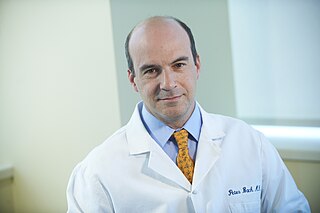In the healthcare industry, pay for performance (P4P), also known as "value-based purchasing", is a payment model that offers financial incentives to physicians, hospitals, medical groups, and other healthcare providers for meeting certain performance measures. Clinical outcomes, such as longer survival, are difficult to measure, so pay for performance systems usually evaluate process quality and efficiency, such as measuring blood pressure, lowering blood pressure, or counseling patients to stop smoking. This model also penalizes health care providers for poor outcomes, medical errors, or increased costs. Integrated delivery systems where insurers and providers share in the cost are intended to help align incentives for value-based care.
Fee-for-service (FFS) is a payment model where services are unbundled and paid for separately.
Christine K. Cassel is a leading expert in geriatric medicine, medical ethics and quality of care. She is planning dean of the new Kaiser Permanente School of Medicine. Until March 2016, she was president and CEO of the National Quality Forum. Previously, Cassel served as president and CEO of the American Board of Internal Medicine and the ABIM Foundation.
John E. "Jack" Wennberg was the pioneer and leading researcher of unwarranted variation in the healthcare industry. In four decades of work, Wennberg has documented the geographic variation in the healthcare that patients receive in the United States. In 1988, he founded the Center for the Evaluative Clinical Sciences at Dartmouth Medical School to address that unwarranted variation in healthcare.

Donald M. Berwick is a former Administrator of the Centers for Medicare and Medicaid Services (CMS). Prior to his work in the administration, he was President and Chief Executive Officer of the Institute for Healthcare Improvement a not-for-profit organization.
Healthcare reform in the United States has a long history. Reforms have often been proposed but have rarely been accomplished. In 2010, landmark reform was passed through two federal statutes: the Patient Protection and Affordable Care Act (PPACA), signed March 23, 2010, and the Health Care and Education Reconciliation Act of 2010, which amended the PPACA and became law on March 30, 2010.
Health information technology (HIT) is health technology, particularly information technology, applied to health and health care. It supports health information management across computerized systems and the secure exchange of health information between consumers, providers, payers, and quality monitors. Based on a 2008 report on a small series of studies conducted at four sites that provide ambulatory care – three U.S. medical centers and one in the Netherlands, the use of electronic health records (EHRs) was viewed as the most promising tool for improving the overall quality, safety and efficiency of the health delivery system.
Carelon Health, a subsidiary of Elevance Health through its Carelon brand, is an integrated health plan and care delivery system for Medicare and Medicaid patients. The company was founded in 1992 as CareMore by Sheldon Zinberg and Johnn Edelston, President of HealthPro Associates through the merger of Community IPA managed by HealthPro Associates and Internal Medicine Specialists Medical Group, managed by Dr. Zinberg. It was based on the Sac-Sierra Medical Clinic structure of a "clinic without walls". CareMore was structured as a partnership of corporations with a wrap-around IPA. The ownership included 33 mostly independent primary care physicians as a small Southern California regional medical partnership. the company was rebranded as Carelon Health in 2024. Today, Carelon Health serves 125,000 patients across 9 states with annual revenues of $1.2B.
Bundled payment is the reimbursement of health care providers "on the basis of expected costs for clinically-defined episodes of care." It has been described as "a middle ground" between fee-for-service reimbursement and capitation, given that risk is shared between payer and provider. Bundled payments have been proposed in the health care reform debate in the United States as a strategy for reducing health care costs, especially during the Obama administration (2009–2016). Commercial payers have shown interest in bundled payments in order to reduce costs. In 2012, it was estimated that approximately one-third of the United States healthcare reimbursement used bundled methodology.

Healthcare in the United States is largely provided by private sector healthcare facilities, and paid for by a combination of public programs, private insurance, and out-of-pocket payments. The U.S. is the only developed country without a system of universal healthcare, and a significant proportion of its population lacks health insurance. The United States spends more on healthcare than any other country, both in absolute terms and as a percentage of GDP; however, this expenditure does not necessarily translate into better overall health outcomes compared to other developed nations. Coverage varies widely across the population, with certain groups, such as the elderly and low-income individuals, receiving more comprehensive care through government programs such as Medicaid and Medicare.
Glenn Laffel is a physician and health IT entrepreneur. He formerly served as the Senior Vice President of Clinical Affairs for Practice Fusion, a San Francisco-based company that offers a Web-based Electronic Health Record (EHR) for free to physicians.
An accountable care organization (ACO) is a healthcare organization that ties provider reimbursements to quality metrics and reductions in the cost of care. ACOs in the United States are formed from a group of coordinated health-care practitioners. They use alternative payment models, normally, capitation. The organization is accountable to patients and third-party payers for the quality, appropriateness and efficiency of the health care provided. According to the Centers for Medicare and Medicaid Services, an ACO is "an organization of health care practitioners that agrees to be accountable for the quality, cost, and overall care of Medicare beneficiaries who are enrolled in the traditional fee-for-service program who are assigned to it".
Unnecessary health care is health care provided with a higher volume or cost than is appropriate. In the United States, where health care costs are the highest as a percentage of GDP, overuse was the predominant factor in its expense, accounting for about a third of its health care spending in 2012.

Peter B. Bach is a physician and writer in New York City. He is the Chief Medical Officer of DELFI Diagnostics and was previously an attending and researcher at Memorial Sloan-Kettering Cancer Center where he was the Director of the Center for Health Policy and Outcomes. His research focuses on healthcare policy, particularly as it relates to Medicare, racial disparities in cancer care quality, and lung cancer. Along with his scientific writings he is a frequent contributor to The New York Times and other newspapers.
Health care quality is a level of value provided by any health care resource, as determined by some measurement. As with quality in other fields, it is an assessment of whether something is good enough and whether it is suitable for its purpose. The goal of health care is to provide medical resources of high quality to all who need them; that is, to ensure good quality of life, cure illnesses when possible, to extend life expectancy, and so on. Researchers use a variety of quality measures to attempt to determine health care quality, including counts of a therapy's reduction or lessening of diseases identified by medical diagnosis, a decrease in the number of risk factors which people have following preventive care, or a survey of health indicators in a population who are accessing certain kinds of care.
Health care analytics is the health care analysis activities that can be undertaken as a result of data collected from four areas within healthcare; claims and cost data, pharmaceutical and research and development (R&D) data, clinical data, and patient behavior and sentiment data (patient behaviors and preferences,. Health care analytics is a growing industry in the United States, expected to grow to more than $31 billion by 2022. The industry focuses on the areas of clinical analysis, financial analysis, supply chain analysis, as well as marketing, fraud and HR analysis.
Steven Pearson is an American physician, bioethicist, and the Founder and President of the non-profit health policy and comparative effectiveness research organization Institute for Clinical and Economic Review in Boston, MA. He conducts research on cost-effectiveness analysis and healthcare technology assessment. He is also a lecturer in Harvard's Department of Population Medicine and a member of the National Institutes of Health (NIH) Comparative Effectiveness Research Steering Committee.
Elliott S. Fisher is a health policy researcher and advocate for improving health system performance in the United States. He helped develop the concept of accountable care organizations and championed their adoption by Medicare. The development of the Affordable Care Act was influenced by his research on disparities in healthcare spending and utilization across the United States. He has strongly supported a rapid transition from fee-for-service to pay-for-performance models in the U.S. healthcare industry. He is a tenured faculty member at Dartmouth College, where he teaches in the Masters in Public Health program.
The Oncology Care Model (OCM) is an episode-based payment system developed by the Center for Medicare and Medicaid Innovation. The multipayer model is designed for discrete instances of care, especially those involving chemotherapy, which triggers the six-month episode. The program combines fee-for-service (FFS) payments for established services, monthly payments for additional care under a structured guideline, and performance-based payments weighed against quality metrics and benchmarks.
Nancy Keating is an American physician who works at the Brigham and Women's Hospital and is a professor at Harvard Medical School. Her research considers the factors that influence quality care for people suffering from cancer.


